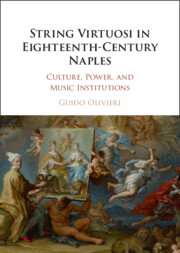Book contents
- String Virtuosi in Eighteenth-Century Naples
- String Virtuosi in Eighteenth-Century Naples
- Copyright page
- Dedication
- Contents
- Figures
- Tables
- Music Examples
- Acknowledgments
- Introduction
- 1 Music Institutions in Naples
- 2 The Formation of the Neapolitan String Virtuosi
- 3 Cello Virtuosi
- 4 Between Naples and Paris
- 5 Neapolitan Virtuosi in the Public Sphere
- 6 Neapolitan Instrumental Music under the Austrian Domination
- 7 Under the Wings of the Imperial Eagle
- Epilogue
- Bibliography
- Index
Epilogue
Published online by Cambridge University Press: 13 January 2024
- String Virtuosi in Eighteenth-Century Naples
- String Virtuosi in Eighteenth-Century Naples
- Copyright page
- Dedication
- Contents
- Figures
- Tables
- Music Examples
- Acknowledgments
- Introduction
- 1 Music Institutions in Naples
- 2 The Formation of the Neapolitan String Virtuosi
- 3 Cello Virtuosi
- 4 Between Naples and Paris
- 5 Neapolitan Virtuosi in the Public Sphere
- 6 Neapolitan Instrumental Music under the Austrian Domination
- 7 Under the Wings of the Imperial Eagle
- Epilogue
- Bibliography
- Index
Summary
The final chapter summarizes the significance of the findings presented in the book and indicates future directions of research. Far from being an obscure aspect of the Neapolitan musical milieu, instrumental music formed a vital element in the artistic culture of the capital. It was used as a tool to display power in the rapid shifting of regimes occurred at the turn of the eighteenth century, and became the expression of the social and professional opportunities open to musicians. The circulation of music and musicians attested the fertile exchanges with other European centers and put Neapolitan music culture along the main political and economic routes. The cultivation of instrumental music in Naples was not interrupted with the creation of an independent kingdom in 1734. If King Charles of Bourbon gave to the opera a new venue with the construction of the San Carlo theater, instrumental music was still performed in the private salons of the aristocracy. The importance of these findings lies in their contribution in delineating neglected paths of research, pointing at common mechanisms of formation, practice, and patronage of instrumental music. Yet aspects such as concert life and venues, and the development of the concerto in Naples with its specific mechanisms of promotion, remain largely unexplored areas.
Keywords
- Type
- Chapter
- Information
- String Virtuosi in Eighteenth-Century NaplesCulture, Power, and Music Institutions, pp. 236 - 240Publisher: Cambridge University PressPrint publication year: 2023

